"I invented jazz" is how Jelly Roll Morton often introduced himself. And the fact is he was probably right. That is, jazz as we've come to know it today. Jazz was a hybrid of musical influences from the rhythms of Africa brought into New Orleans by slaves to the refinement of that natural sound by early 19th century classically trained black composers like Edmund Dede. Jazz was a collection of musical idioms that began at the turn of the century to find a dance groove via the early sounds of Buddy Bolden.
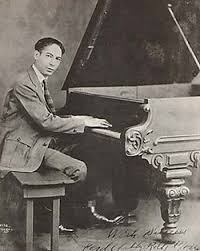
Don Marquis, curator of the Louisiana Museum Jazz Collection and a leading authority on the evolution of jazz and the music of Buddy Bolden, believes that Bolden was the first musician to add improvisation and a freewheeling spirit to what would eventually become danceable music. That danceable music captured the earlier spirit of the slaves of Congo Square and later the music that emerged from Black Storyville and Jazz Alley around Liberty and Perdido Streets. Clearly Bolden was a musical innovator and was able to project the evolving music of the time. He was a first-rate musician and a major influence on jazz.
"But Jelly Roll Morton," writes noted music scholar Eileen Southern in The Music of Black Americans, "is regarded as the first true jazz composer. He was the first to write down his jazz arrangements in musical notation, and he was the originator of a large number of the musical compositions that became staples in the jazz repertory." Morton's claim to having invented jazz, according to most jazz historians has tremendous merit.
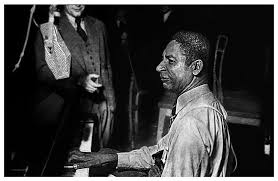
"Jelly Roll Morton," states Eddie Edwards, Executive Director of the Louis Armstrong Foundation in New Orleans, "was first and foremost, a musician. He had the respect of other musicians. Jazz players like Kid Ory and Barney Bigard, two giants in the evolution of jazz would rush to work with Jelly, that's the type of respect he held."
New Orleans native Ferdinand Joseph Le Menthe, enshrined in jazz folklore as Jelly Roll Morton, was born in 1885 to a middle class Creole family on Frenchmen Street at the corner of Robertson. The house remains intact and stands today. Details about Jelly's early life are somewhat sketchy. What's clear however, is that at about the age of 8, Ferdinand received some basic but important formal guitar music lessons. Some historians have suggested that young Ferdinand did not take these initial lessons very seriously. However, the fact that a relatively short time later, he was playing piano in the 'Sporting Houses' of Storyville suggests otherwise.
By the time he was in his early twenties, according to Martin Williams in his book, Jazz Masters of New Orleans, Jelly was traveling throughout Louisiana, Memphis and the entire Gulf Coast as a somewhat in-demand musician.
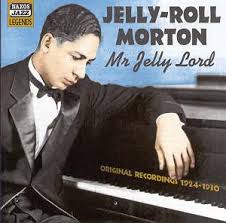
By 1915, Morton had written and published "Jelly Roll Blues". Between the years 1917-22, Morton had become a "hot Jazz performer" on the West Coast. In 1922, Morton left California to conquer Chicago, which he practically did. It was during the mid-twenties, after Jelly's reputation as a jazz performer of note became widespread, that he began his highly publicized feud with W.C. Handy. At issue was who invented the blues. W.C. Handy was widely billed and known as the man who invented the blues. Morton, who also laid claim to the invention of blues, disputed W.C. Handy's version. The two had performed together in about 1908 when Morton had played Memphis. The dispute would last for several more decades with neither man relinquishing his claim as having been the "Father of the Blues." However, most jazz historians would eventually give the edge to Morton.
Anyone who knew of Jelly Roll Morton or met him in person would state the same thing. His confidence or "cockiness" was ever present. Jelly's demeanor during the first half of the 20th century could be comparable to a young Muhammad Ali decades later. Both were confident in their abilities and both could easily back up their claims.
"Trumpeter Lee Collins," writes Martin Williams, "one of the best jazz session musicians in the country during the '20s, recalled that he was once asked to perform with Jelly in a recording session. When he initially met Jelly Roll Morton, the first thing that Morton said to the astonished Collins was, 'you know you will be working for the world's best jazz piano player...not one of the greatest - I am the Greatest'."
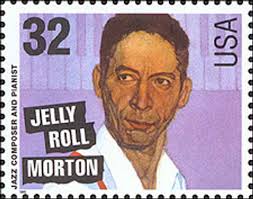
During the '20s, Paul Whiteman, a white jazz musician and one of jazz music's first successful big band leaders, was frequently billed by music promoters as the "King of Jazz." Needless to say, Jelly Roll challenged that claim as well. He confronted one music promoter and club owner on the south side of Chicago, who was booking Whiteman at the time, and stated in no uncertain terms, "You bring Paul Whiteman out here and pay any price he wants because he has the name of 'King of Jazz'. But you happen to be talking to the real 'King of Jazz'. "I invented it and I brought it here."
By 1923, Morton was recording nonstop, and from that period some of the most innovative and creative jazz and popular music emerged. Tunes like "King Porter Stomp," "New Orleans Blues," "Kansas City Stomp," "Shreveport Stomp" and the "Original Jelly Roll Blues." Jazz connoisseurs consider Jelly's work during this period to be one of the defining moments for 20th century popular music. Morton's work had laid the foundation for the next important phase of the evolution of jazz and popular music, swing.
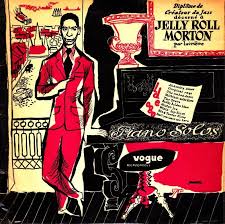
Jelly capped a brilliant, and some would say controversial musical career, with a massive recording session for the Library of Congress in 1938, where he related his version of jazz history to Alan Lomax and illustrated it with piano solos and songs. Fifty-two records with more than one hundred individual compositions resulted.
Just as Louis Armstrong took New Orleans music to an international audience, Jelly Roll Morton continually brought the New Orleans musicians to the fore by placing them in his ever evolving band. New Orleans musicians such as Sidney Bechet, Kid Ory, Henry "Red" Allen, Zutty Singleton - and the list goes on - all owed a great deal of allegiance to the "Roll."

